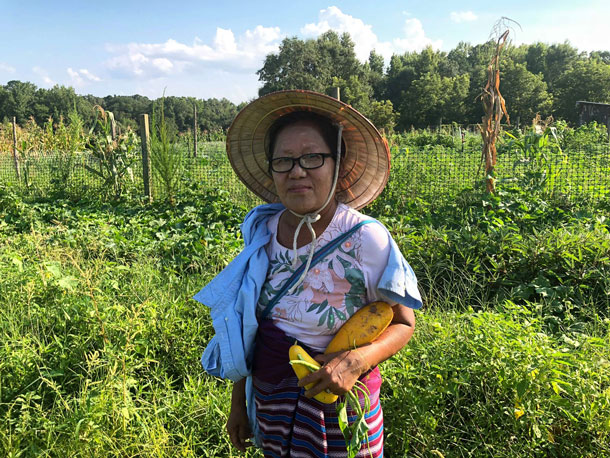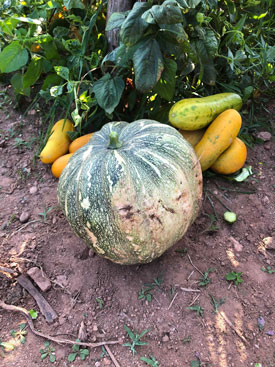Refugees Cultivate Healing Through Gardening
Air Date: Week of February 15, 2019

Moo Paw shows the vegetables she's grown at the Neighbor's Field. (Photo: Sean Powers)
A community garden called the Neighbor's Field in rural Georgia helps refugees heal from the pain and trauma of war by planting a garden. Producer Sean Powers of Georgia Public Broadcasting and the Bitter Southerner podcast has the story.
Transcript
BASCOMB: The United States has long been a place for political refugees to seek safety and put down roots, in some cases literally. In Comer, Georgia a community garden called the Neighbor’s Field is helping refugees work through their trauma by working the land. Producer Sean Powers has our story.
[ROOSTER SOUNDS]
POWERS: It’s a hot Saturday afternoon in Comer, Georgia. Moo Paw is feeding her chickens, hens, goats, and ducks. There’s even a donkey. You could say they’re kind of like her babies. She is one of the many refugees at the Neighbor’s Field, who fled violence and persecution in Myanmar. That’s the country formerly known as Burma.
[PAW SPEAKING IN BURMESE]
POWERS: Moo Paw tells me about her life before coming to the United States. She grew up in Myanmar and recalls living in fear of the Burmese soldiers. She says they would force her family to carry food and other supplies. Gardening at the Neighbor’s Field, she says, provides some relief from those painful memories.
MOO PAW: Gardening here, me forget the war. Me forget the war. Sometimes, me remember my father, how my father go to the Burma soldiers, kicked pappa…
POWERS: She says Burmese soldiers kidnapped her father, and used him as a porter to carry food for them. After leaving Myanmar, Moo Paw lived in a refugee camp in Thailand before moving to the United States with her husband and children. They relocated to the Atlanta area, before settling here in Comer. Her son, Tahay Than, says moving to Comer was to satisfy Moo Paw’s green thumb.
TAHAY: My mom, where she lived in Burma or Thailand, she always liked to plant. You know, working the farm. So, when she farms, that makes her feel like she is home or something, like in a home country, mother country or something. So that’s why she moved to Comer.
POWERS: The Neighbor’s Field is a place of healing for Moo Paw. She comes here twice a day, except Sundays. Sundays, of course, are for church. She shows me around the garden.
PAW: My garden. Here vegetables. Here grass. Me planted the cucumbers this year. Here sweet potato. Very beautiful.
POWERS: It’s that beauty that takes Moo Paw back to memories of her family. She and her son Tahay say in Myanmar, farming for their family was a way of life.
PAW: My grandmother planted rice, peanuts. Chili, corn.
TAHAY: Most of the time, everybody who lived in Burma, they would plant in order to survive.
POWERS: And that makes this garden all the more meaningful. The vegetables growing here, they don’t look like your typical produce that you would find at most supermarkets in the United States. That’s because the seeds come from Myanmar and Thailand. With us on our garden tour is Rebecca Smith. She oversees the day-to-day operations at the Neighbor’s Field. As we chat we spot a pumpkin from Thailand.
SMITH: It’s green, kind of stripy green and light yellow. How do you cook this, Moo Paw?
PAW: Garlic, onions, a little chicken.

Much of the produce at the Neighbor's Field is grown using seeds from Myanmar and Thailand. (Photo: Sean Powers)
POWERS: The flavors growing in Moo Paw’s soil are just a small part of the pie. There are two-dozen plots of land at the Neighbor’s Field that are being rented by refugees from Myanmar. For a large plot, it’s a hundred dollars a year. Rebecca Smith says it’s been incredible to see how working the farm helps build community.
SMITH: What’s the most surprising to me is, I mean their gardening abilities are amazing, but how people can go and walk through our woods here and they know plants that we can eat that I never knew were edible. I mean they’re just amazing foragers, they can figure out how to cook everything and make it taste good, and it’s just stuff that we think are weeds. Like sometimes people will be out here just butchering a pig for a celebration or Moo Paw’s out here feeding her chickens and people in the garden and you just feel like you’re in a different world, not Comer, Georgia.
POWERS: It’s a world that brings healing. For Living on Earth, I’m Sean Powers in Atlanta.
BASCOMB: That story comes to us courtesy of the Bitter Southerner Podcast.
Links
Season One of The Bitter Southerner Podcast
The Neighbor’s Field, a ministry by Jubilee Partners in Comer, Georgia
Living on Earth wants to hear from you!
Living on Earth
62 Calef Highway, Suite 212
Lee, NH 03861
Telephone: 617-287-4121
E-mail: comments@loe.org
Newsletter [Click here]
Donate to Living on Earth!
Living on Earth is an independent media program and relies entirely on contributions from listeners and institutions supporting public service. Please donate now to preserve an independent environmental voice.
NewsletterLiving on Earth offers a weekly delivery of the show's rundown to your mailbox. Sign up for our newsletter today!
 Sailors For The Sea: Be the change you want to sea.
Sailors For The Sea: Be the change you want to sea.
 The Grantham Foundation for the Protection of the Environment: Committed to protecting and improving the health of the global environment.
The Grantham Foundation for the Protection of the Environment: Committed to protecting and improving the health of the global environment.
 Contribute to Living on Earth and receive, as our gift to you, an archival print of one of Mark Seth Lender's extraordinary wildlife photographs. Follow the link to see Mark's current collection of photographs.
Contribute to Living on Earth and receive, as our gift to you, an archival print of one of Mark Seth Lender's extraordinary wildlife photographs. Follow the link to see Mark's current collection of photographs.
 Buy a signed copy of Mark Seth Lender's book Smeagull the Seagull & support Living on Earth
Buy a signed copy of Mark Seth Lender's book Smeagull the Seagull & support Living on Earth

